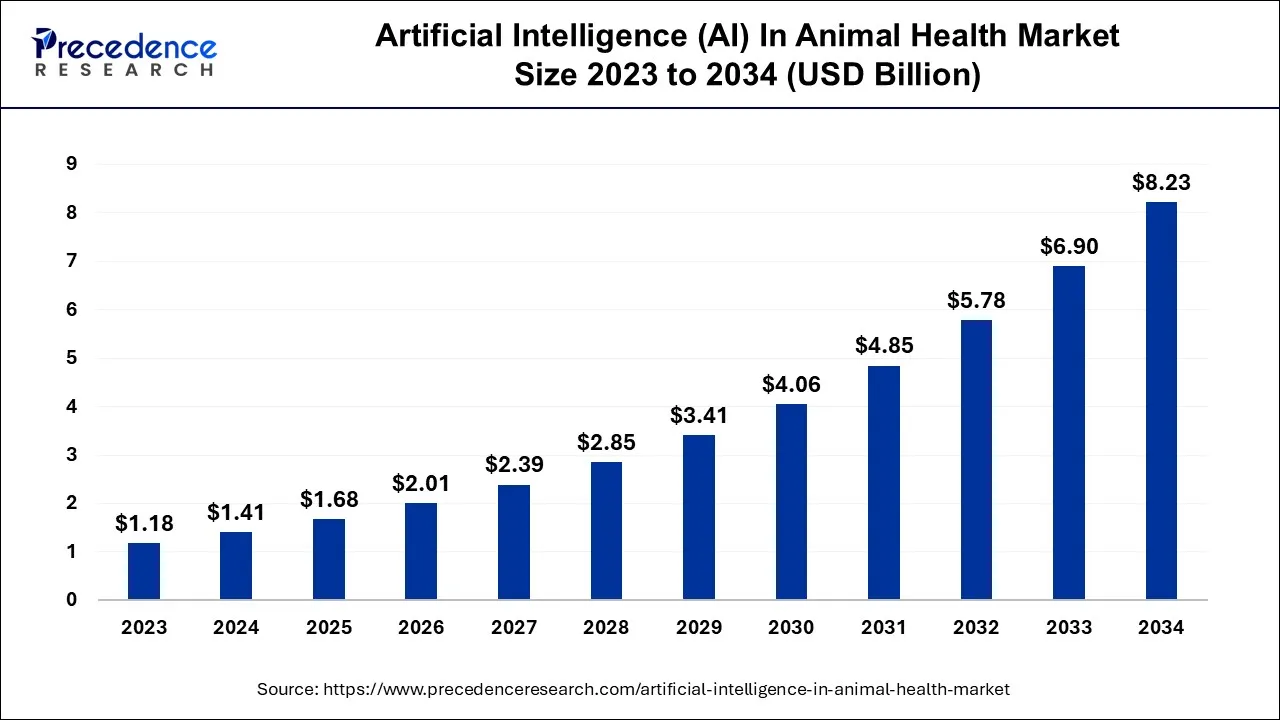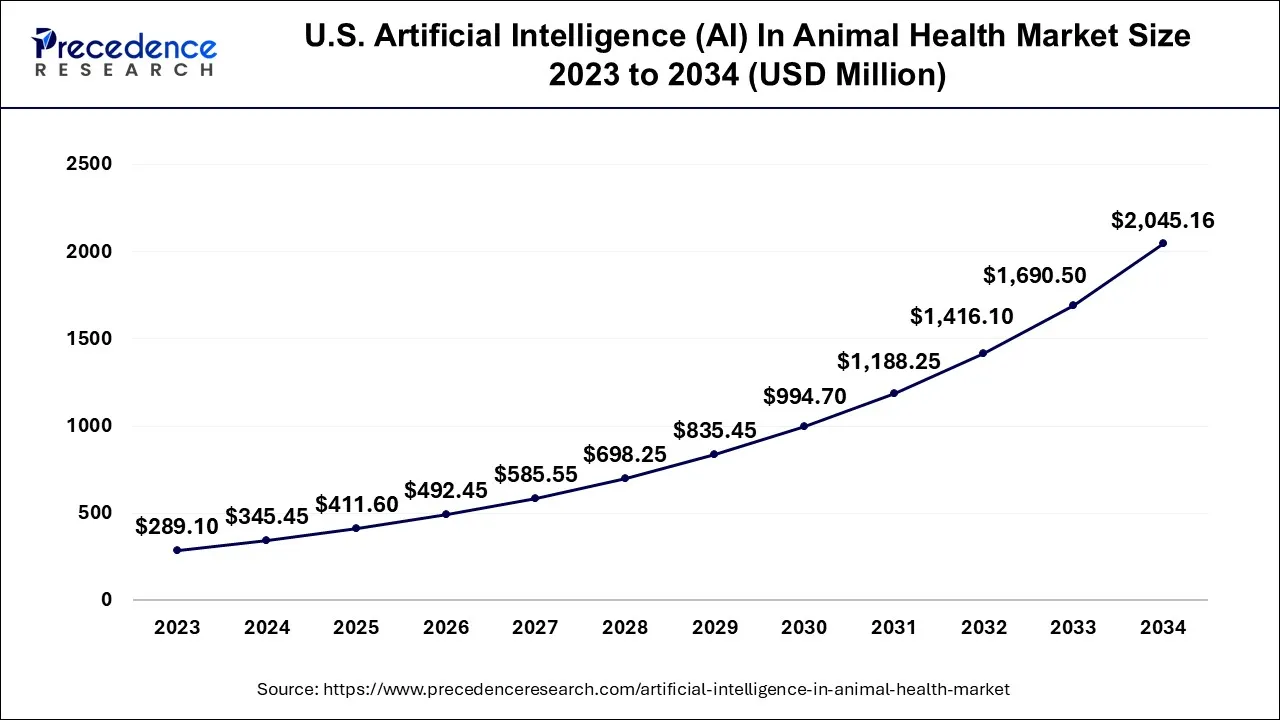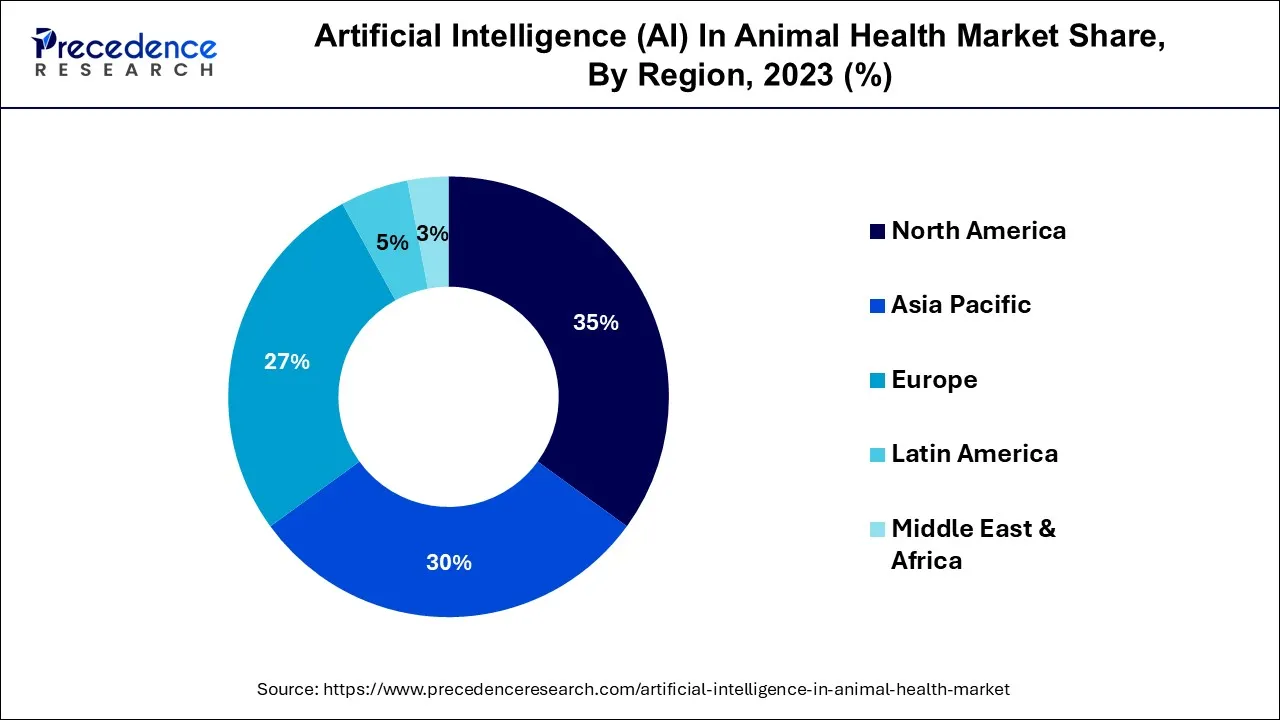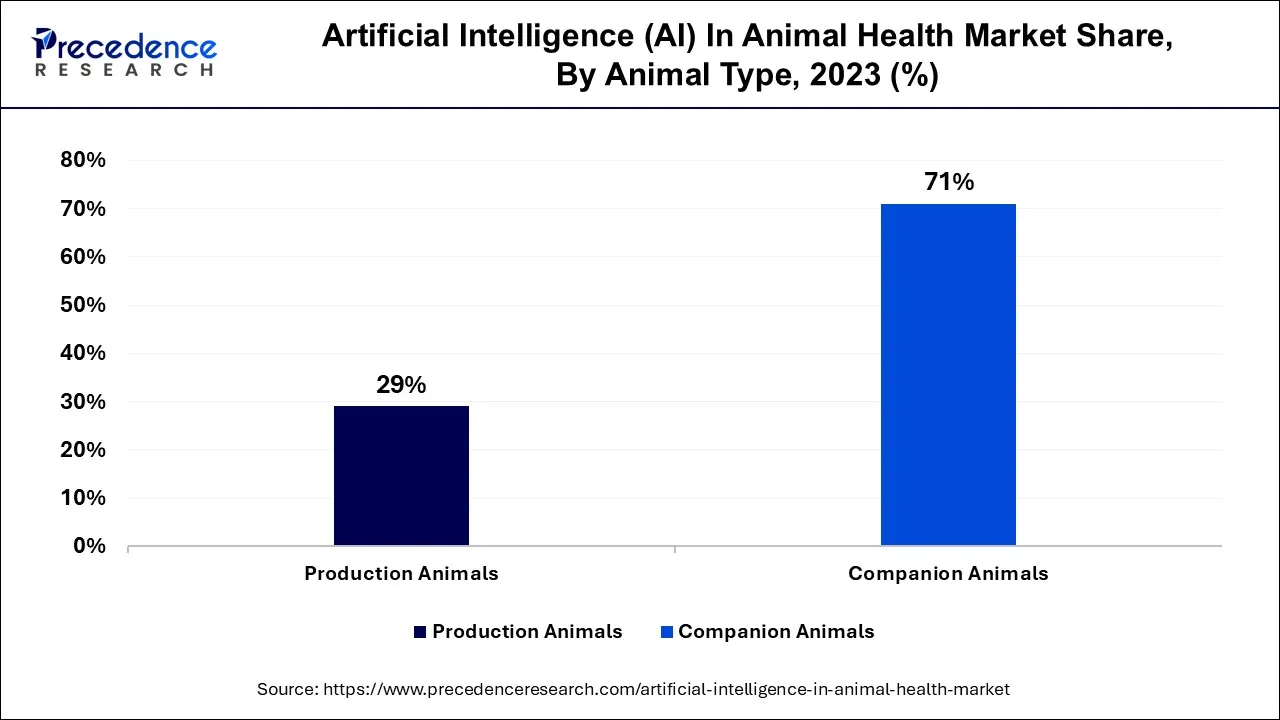August 2024
The global artificial intelligence (AI) in animal health market size is calculated at USD 1.41 billion in 2024, grew to USD 1.68 billion in 2025, and is predicted to hit around USD 8.23 billion by 2034, expanding at a CAGR of 19.3% between 2024 and 2034. The North America artificial intelligence (AI) in animal health market size accounted for USD 490 million in 2024 and is anticipated to grow at the fastest CAGR of 19.54% during the forecast year.
The global artificial intelligence (AI) in animal health market size is expected to be valued at USD 1.41 billion in 2024 and is anticipated to reach around USD 8.23 billion by 2034, expanding at a CAGR of 19.3% over the forecast period 2024 to 2034.

The U.S. artificial intelligence (AI) in animal health market size accounted for USD 345.45 million in 2024 and is projected to be worth around USD 2,045.16 million by 2034, poised to grow at a CAGR of 19.34% from 2024 to 2034.

North America has held the largest revenue share 35% in 2023. North America commands a substantial share of artificial intelligence (AI) in animal health market due to several key factors. The region boasts advanced technological infrastructure, a robust healthcare ecosystem, and a strong emphasis on animal welfare. These factors have facilitated the rapid adoption of AI solutions in veterinary care and animal agriculture. Additionally, the presence of prominent AI technology providers, research institutions, and government support has further accelerated the market's growth. North America's early recognition of the potential benefits of AI in animal health positions it as a dominant player in this evolving market.

Asia-Pacific is estimated to observe the fastest expansion. The region's dominant growth in artificial intelligence (AI) in animal health market is underpinned by several crucial elements. To begin, it boasts some of the globe's most extensive agricultural sectors, particularly in terms of livestock farming. This is further accentuated by the region's burgeoning population and the escalating demand for animal-based products, necessitating more effective animal health management. Additionally, the Asia-Pacific region exhibits a growing penchant for embracing cutting-edge technologies, including AI, driven by its commitment to agricultural innovation and sustainable practices. These collective dynamics firmly establish the region as a prominent and influential player in the AI in animal health market, contributing significantly to its sizeable market growth.
Artificial intelligence in animal health market pertains to the utilization of cutting-edge computational methods, such as machine learning and data analysis, to augment the diagnosis, treatment, and supervision of animal well-being. AI applications in this domain encompass diverse facets, including the identification of diseases, ongoing monitoring, and forecasting, as well as the precision management of livestock and veterinary healthcare. These technologies offer heightened precision and effectiveness in animal healthcare, resulting in superior outcomes, reduced expenses, and more environmentally sustainable agricultural practices. The AI in animal health market is swiftly progressing, fueled by the growing demand for data-informed insights and inventive solutions within the veterinary and agricultural sectors.
| Report Coverage | Details |
| Growth Rate from 2024 to 2034 | CAGR of 19.3% |
| Market Size in 2024 | USD 1.41 Billion |
| Market Size by 2034 | USD 8.23 Billion |
| Largest Market | North America |
| Base Year | 2023 |
| Forecast Period | 2024 to 2034 |
| Segments Covered | By Solution, By Application, and By Animal Type |
| Regions Covered | North America, Europe, Asia-Pacific, Latin America, and Middle East & Africa |
Disease detection and prevention
The catalytic influence of disease detection and prevention on propelling the growth of artificial intelligence (AI) in animal health market is undeniable. AI is at the forefront of transforming animal healthcare by enabling swift, precise, and early identification of diseases and health anomalies in animals. Through the utilization of machine learning algorithms, AI can meticulously analyze extensive and multifaceted datasets, incorporating genetic, environmental, and behavioral parameters, to discern subtle patterns and irregularities that often elude human observation. This proficiency results in timely interventions and preemptive strategies, alleviating the financial burden of treatment costs and minimizing the distress experienced by animals.
The amalgamation of AI-driven diagnostic tools and prognostic models not only elevates the general health and welfare of animals but also augments the efficiency and sustainability of animal agriculture. Consequently, the demand for AI in animal health is skyrocketing, with farmers, veterinarians, and animal health practitioners acknowledging the immense worth of these technologies in safeguarding animal populations, mitigating economic losses, and ensuring the ethical treatment of animals. This collective impetus drives the market's expeditious expansion.
Limited adoption in developing regions
The limited adoption of artificial intelligence in animal health in developing regions stands as a formidable restraint on the market's growth. While AI technologies offer substantial benefits, including disease detection, precision livestock farming, and enhanced animal well-being, the adoption rate in these regions remains sluggish due to several critical factors. Firstly, the cost associated with acquiring and implementing AI systems poses a significant barrier. Many small-scale farmers in developing regions may lack the financial resources to invest in these advanced technologies. Additionally, the lack of adequate infrastructure, including reliable internet connectivity and data storage facilities, hampers the effective deployment of AI solutions.
Furthermore, there may be a shortage of technical expertise and training in AI applications. Farmers and veterinary professionals in these regions may require education and training to harness the full potential of these technologies. The regulatory environment may also be less accommodating or clear, leading to uncertainty and reluctance to adopt AI in animal health practices. In summary, the limited adoption of AI in animal health in developing regions is primarily due to financial constraints, infrastructure deficiencies, a lack of technical expertise, and regulatory uncertainties, collectively constraining the market's growth potential in these areas.
Remote monitoring and telehealth
Remote monitoring and telehealth are pivotal in creating compelling opportunities within artificial intelligence (AI) in animal health market. These technologies offer real-time, remote access to animal health data, enabling veterinarians and farmers to monitor animals' vital signs and behavior, diagnose issues, and administer timely care from afar. AI plays a central role by processing the wealth of data generated by these systems, making rapid and accurate assessments. The opportunities extend to improved animal health management, especially in large-scale or geographically dispersed farming operations, where the ability to remotely monitor and diagnose issues can significantly reduce the logistical challenges associated with on-site inspections.
Furthermore, the integration of AI enhances the predictive capabilities, offering opportunities for early disease detection and precise treatment recommendations, ultimately leading to healthier animal populations, reduced losses, and enhanced operational efficiency, positioning the AI in animal health market as a catalyst for transformative change in the animal agriculture industry.
According to the solution, the hardware segment held 64% revenue share in 2023. The hardware segment claims a substantial share in the Artificial Intelligence (AI) in animal health market primarily due to its fundamental role in facilitating the implementation and effectiveness of AI solutions. Hardware components, encompassing sensors, cameras, and monitoring tools, play a pivotal role in gathering and transmitting essential data. These devices furnish real-time information sourced from animals, including vital statistics and behavioral patterns, which serves as the cornerstone for AI-powered analytics and decision support. With the increasing adoption of AI in animal health, there is a growing demand for durable, dependable, and seamlessly integrated hardware solutions, consolidating the hardware segment's prominent position within the market.
The software and services segment is anticipated to expand at a significantly CAGR of 20.8% during the projected period. The software and services segment commands a significant share in artificial intelligence (AI) in animal health market due to its pivotal role in providing the technological support for AI adoption. AI applications for animal health heavily rely on sophisticated software, including data analytics, machine learning algorithms, and cloud-based solutions, to process vast datasets and deliver actionable insights. Services, such as consulting, training, and support, are essential for assisting farmers and veterinary professionals in effectively implementing and utilizing AI technologies. As a result, the software and services segment plays a crucial role in enabling the successful integration of AI in animal health practices, driving its major market share.
Based on the application, the diagnostics segment is anticipated to hold the largest market share of 50% in 2023. The diagnostics segment holds a major share in artificial intelligence (AI) in animal health market due to its critical role in enhancing disease detection and prevention. AI-powered diagnostics offer swift, accurate, and cost-effective identification of health issues in animals, reducing treatment expenses and ensuring early interventions. This not only leads to improved animal welfare but also minimizes economic losses in the animal agriculture sector. The high demand for precise and efficient diagnostic tools, driven by the need to safeguard animal populations and maintain production efficiency, cements the diagnostics segment's dominant position in the AI in animal health market.
On the other hand, the other segment is projected to grow at the fastest rate over the projected period. The other segment holds a major growth in artificial intelligence (AI) in animal health market due to its diverse and expansive applications. This category encompasses a wide range of AI applications, including genetic analysis, reproductive health monitoring, and behavior prediction, among others. These versatile AI solutions cater to various needs across the animal health industry, making them highly adaptable to different scenarios. Moreover, as the AI in animal health market continues to evolve, this segment is continually expanding and innovating, contributing to its significant growth in the overall market, driven by the demand for comprehensive and specialized solutions.
In 2023, the companion animal segment had the highest market share of 71% on the basis of the Animal type. The companion animal segment holds a significant share in artificial intelligence (AI) in animal health market due to a combination of factors. Firstly, there is a growing trend of pet ownership, leading to increased demand for advanced healthcare solutions for these animals. Additionally, the emotional attachment of pet owners to their companion animals drives investment in AI technologies for their well-being. Moreover, companion animal health is often more accessible for technology adoption and implementation compared to the broader livestock sector. These factors collectively contribute to the prominence of the companion animal segment in the AI in animal health market.

The production animal segment is anticipated to expand at the fastest rate over the projected period. The growth of the production animal segment, encompassing livestock like cattle, poultry, and swine, within the artificial intelligence (AI) in animal health market, can be attributed to its substantial scale and economic significance. Production animals play a pivotal role in global food production, and ensuring their health and management is essential for the agricultural sector. AI technologies provide effective solutions for disease identification, monitoring, and the optimization of production processes, resulting in heightened efficiency and increased yields. Consequently, the production animal sector retains a prominent position in the AI in animal health market, driven by its substantial economic impact and the imperative for sustainable and effective food production.
Segments Covered in the Report
By Solution
By Application
By Animal Type
By Geography
For inquiries regarding discounts, bulk purchases, or customization requests, please contact us at sales@precedenceresearch.com
No cookie-cutter, only authentic analysis – take the 1st step to become a Precedence Research client
August 2024
December 2024
September 2024
April 2025